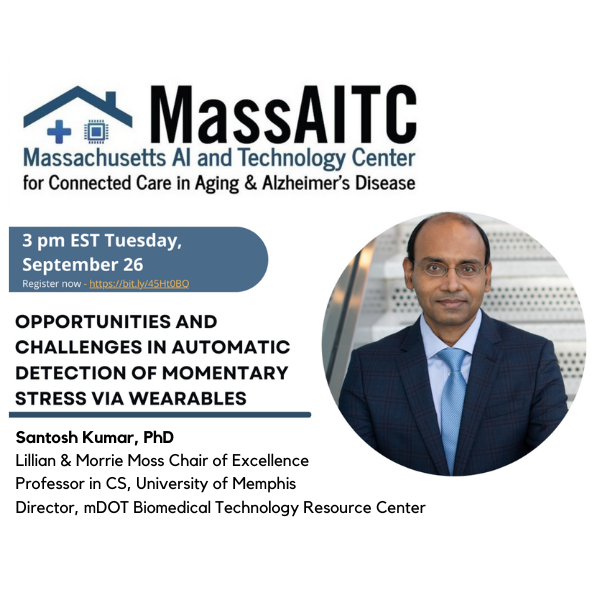MassAITC Webinar on Detecting Momentary Stress with Santosh Kumar
Title: Opportunities and Challenges in Automatic Detection of Momentary Stress Via Wearables
Speaker: Santosh Kumar, PhD
Affiliation: Lillian & Morrie Moss Chair of Excellence Professor in Computer Science, Univ. of Memphis / Director, mDOT Biomedical Technology Resource Center
Date: September 26, 2023; 3 PM ET
Registration Link: https://umass-amherst.zoom.us/meeting/register/tJEqde2vrDgrGt1VopdQmEq3slT6UNFy_sGq#/registration
Abstract:
Stress, a double-edged sword, has been long recognized for its potential to fuel productivity, enhance performance, and provide life-saving bursts of energy in times of imminent danger. Excessive and repetitive stress, however, can harm our physiological, psychological, behavioral, and social well-being. Due to its wide prevalence and impact in our lives, stress detection is increasingly being introduced in smartwatches, rings, and other wearables to help us become aware of and mitigate excessive stress. But unlike activity tracking, stress detection is yet to be adopted widely. What makes real-life stress detection so challenging? What progress has been made thus far and what else needs to be done to make stress detection truly useful?
Bio:
Santosh Kumar is the Lillian & Morrie Moss Chair of Excellence Professor in Computer Science at the University of Memphis, Director of NIH-funded mDOT Biomedical Technology Resource Center, and CEO & co-founder of CuesHub, PBC. His research team develops wearable AI for sensor-triggered mHealth interventions and to better understand and mitigate new privacy threats emerging from wearable AI. Apps for smartphones and smartwatches and companion big data software for the cloud developed by his team has been used to conduct scientific studies nationwide, producing hundreds of terabytes of sensor data. His team has used these data to develop AI models for detecting stress, stressful conversations, smoking, craving, cocaine use, brushing, and flossing from wearables.







